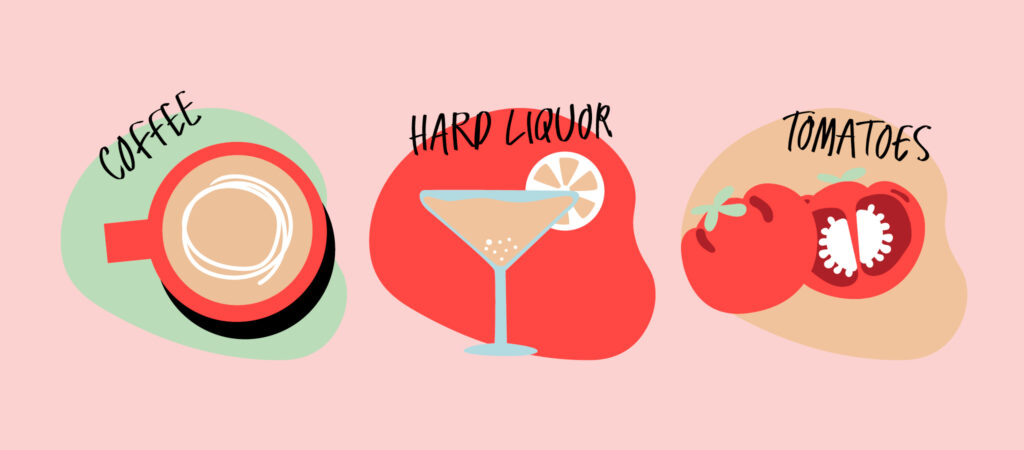7 Foods That May Be Triggering Your Rosacea
Rosacea can be a mysterious condition for those who suffer from, coming and going seemingly at random. Even so, there are generally a few contributing factors at play that can make rosacea flare ups more likely — often in the form of specific foods.
Depending on the type of rosacea you have, a flare up could mean anything from some mild redness to a breakout of acne-like pustules. While food triggers may vary from person to person, here are 7 of the most common:
- Hot Beverages
Any sort of heat that causes facial flushing can act as a trigger for a rosacea flare. For that reason hot beverages can be rosacea triggers. Drinking a hot beverage too quickly, or in some cases just drinking one at all, can cause the blood vessels in the face to dilate and can mean a rosacea flare-up.
Nurx offers prescription treatment for acne, anti aging, melasma, rosacea, and eyelash growth.
This doesn’t mean that you need to cut coffee and tea out of your diet entirely, though, you just may need to learn to enjoy it lukewarm or iced. That may even safeguard against rosacea flare-ups: one study found that regular caffeine consumption among women was correlated with a reduced risk of incident rosacea.
- Spicy Foods
Foods that contain capsaicin, the chemical that causes things to taste spicy, are among the most universal triggers for people who suffer from rosacea. One survey from the National Rosacea Society found that hot peppers, chili, salsa, chili powder, and hot sauce are the most common rosacea-inducing foods for people who find spice triggering.
- Dairy
If you struggle to digest dairy foods either because you are lactose intolerant or are sensitive to milk proteins, then milk-based food might be a trigger for you. One of the primary effects of a dairy allergy, even a mild one, is inflammation, an irritation of the skin that can lead to rosacea flare-ups.
Not everyone will find their rosacea triggered by dairy products, but it’s worth looking into. See if switching to a plant-based milks leads to fewer rosacea symptoms.
- Histamine-heavy Foods
Histamine is an organic compound and neurotransmitter that the body produces in response to the presence of allergens. Some foods have naturally high levels of histamine—including spinach, eggplant, avocados, yogurt, and certain types of cheese. Others may not have lots of histamine themselves but instead cause the body to produce it. These foods include bananas, tomatoes, some beans, nuts, and food dyes. While it’s natural to have histamines in your body, they can sometimes cause inflammation or other reactions and trigger your rosacea in the process. Your body may not react equally to all of these foods, so it’s worth doing some testing to see which sit well with you and which don’t.
- Foods that contain cinnamaldehyde
Cinnamaldehyde can cause a warming sensation that leads to flushing related to rosacea. Foods that contain cinnamaldehyde include cinnamon, tomatoes, chocolate, citrus fruits. Chocolate has the one-two punch of being a food that spikes the body’s histamine production while also generally containing dairy. This makes it a no-go for a lot of people who suffer from rosacea, though non-dairy chocolate substitutes may be less of a trigger.
- Alcohol
Alcohol is another multi-pronged rosacea trigger. Like other fermented beverages, it contains high levels of histamines.. What’s more, alcohol can trigger the same effect as hot beverages and spicy foods: a flushing of the face. This could be due to the presence of tannins in drinks like red wine, the dehydration that often accompanies alcohol consumption, or blood vessel dilation caused by increased cytokine production following a few drinks. Some studies have even suggested that drinking may put people at a higher risk for getting rosacea in the first place, though more research is needed to be sure.
While these are only a few of the most common triggers, individuals with rosacea may identify other causes for their flare-ups. A more extensive list of rosacea triggers can be found at the rosacea.org website. Maintaining a rosacea diary can also be helpful.
If you’re having difficulty navigating the ins and outs of managing rosacea flare-ups, we’re here to help. Get in touch with a member of our team today to see what treatment options may be available to you.





